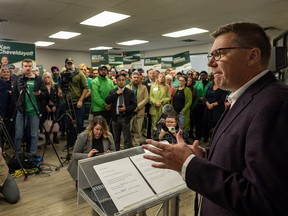Moe’s Saskatchewan Party has led an almost religious crusade against the federal carbon tax, but not its own provincial consumption taxes.

The Saskatchewan Party started its election campaign with party leader Scott Moe touting the largest income tax reduction since 2008.
Moe’s party is proposing to increase the personal income tax exemption, the spousal exemption, the child exemption and the seniors supplement by $500 each year for the next four years. That’s bidding farewell to a lot of revenue.
The party also plans to increase the annual threshold to start charging income tax for a couple to $72,245, which it says is the highest level in Canada. That will exempt about 54,000 people from paying any income tax — another big revenue crater.
However, the Saskatchewan Party declined to make any promises about reducing the six per cent provincial sales tax or the 15-cents-a-litre provincial gas tax. Those consumption taxes are considered just fine.
That makes sense for many economists and others who prefer consumption taxes like the PST as giving people choice about whether they want to make a purchase and incur the penalty of a tax, unlike income tax, which is charged regardless of behaviour.
And Moe’s regime has steadfastly clung to the provincial gas tax, which is also a carbon tax.
Meanwhile, the tax cuts proposed by Carla Beck’s NDP are far simpler and easier to remember. Saskatchewan’s NDP plans to suspend the gas tax and eliminate the PST on groceries and children’s clothing.
But the proposed cuts to the PST and gas tax are supposed to resonate with people since they affect their daily lives in a way that changes to income tax might not in such a visible, visceral manner.
They’re generally viewed as better political promises, even if they might make less overall fiscal sense.
Whether they work, despite their popular appeal, can be questioned.
Former Saskatchewan NDP premier Lorne Calvert lowered the PST two percentage points to five per cent, making it the lowest PST in Canada in 2006. But a year later, the NDP lost the provincial election.
A decade after the Saskatchewan Party assumed power, it imposed the largest tax increase in the province’s history by hiking the PST back up to six per cent in 2017. That budget precipitated the departure of Brad Wall, but the party won another massive majority in 2000.
Saskatchewan’s deficit this year is already projected to hit $354 million, which is higher than expected.
So we’ll need to see the fully costed platform from Moe’s party before we can ultimately judge how its tax plan ranks compared to those of the other parties.
Phil Tank is the digital opinion editor at the Saskatoon StarPhoenix.
Our websites are your destination for up-to-the-minute Saskatchewan news, so make sure to bookmark thestarphoenix.com and leaderpost.com. For Regina Leader-Post newsletters click here; for Saskatoon StarPhoenix newsletters click here